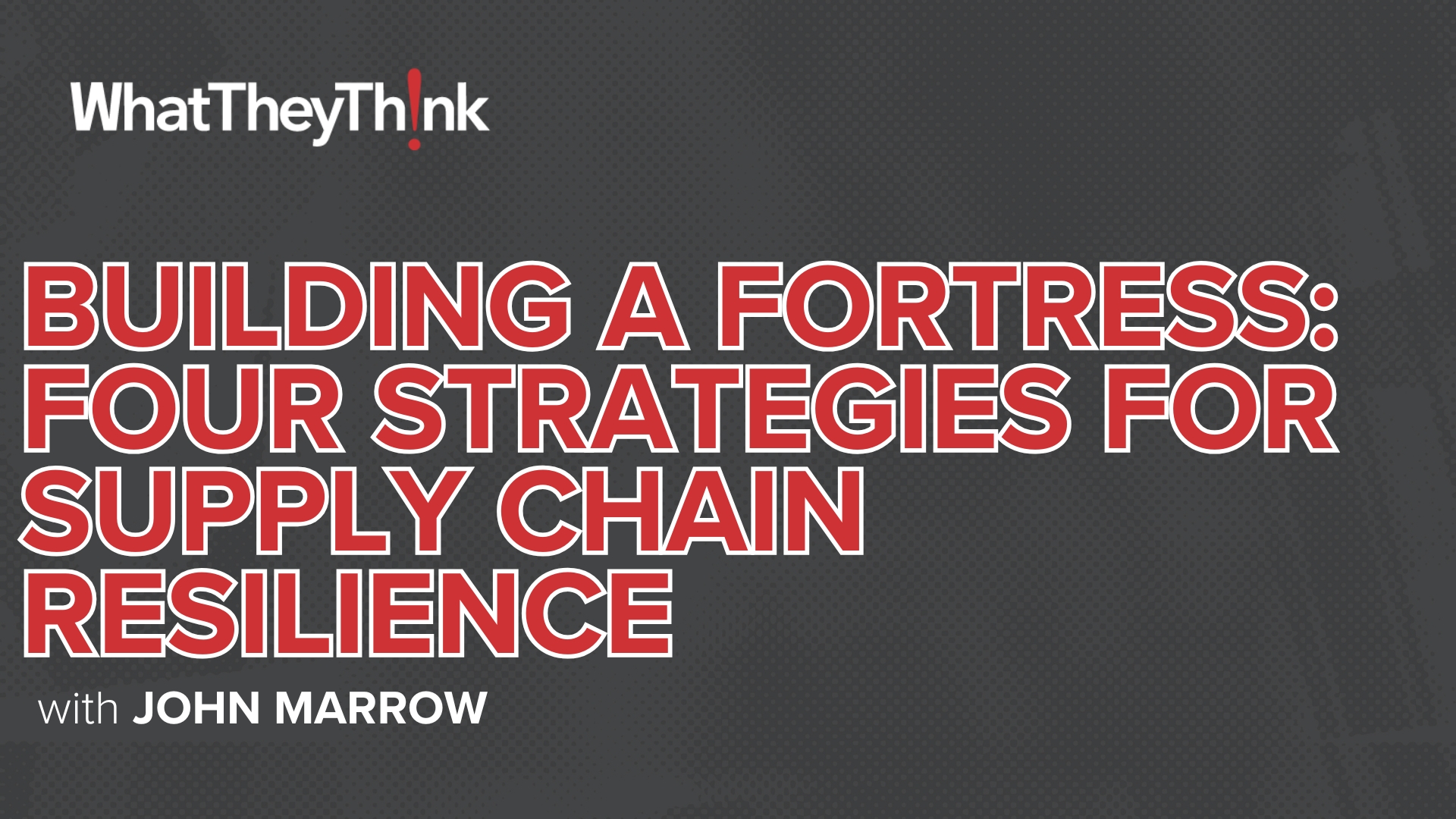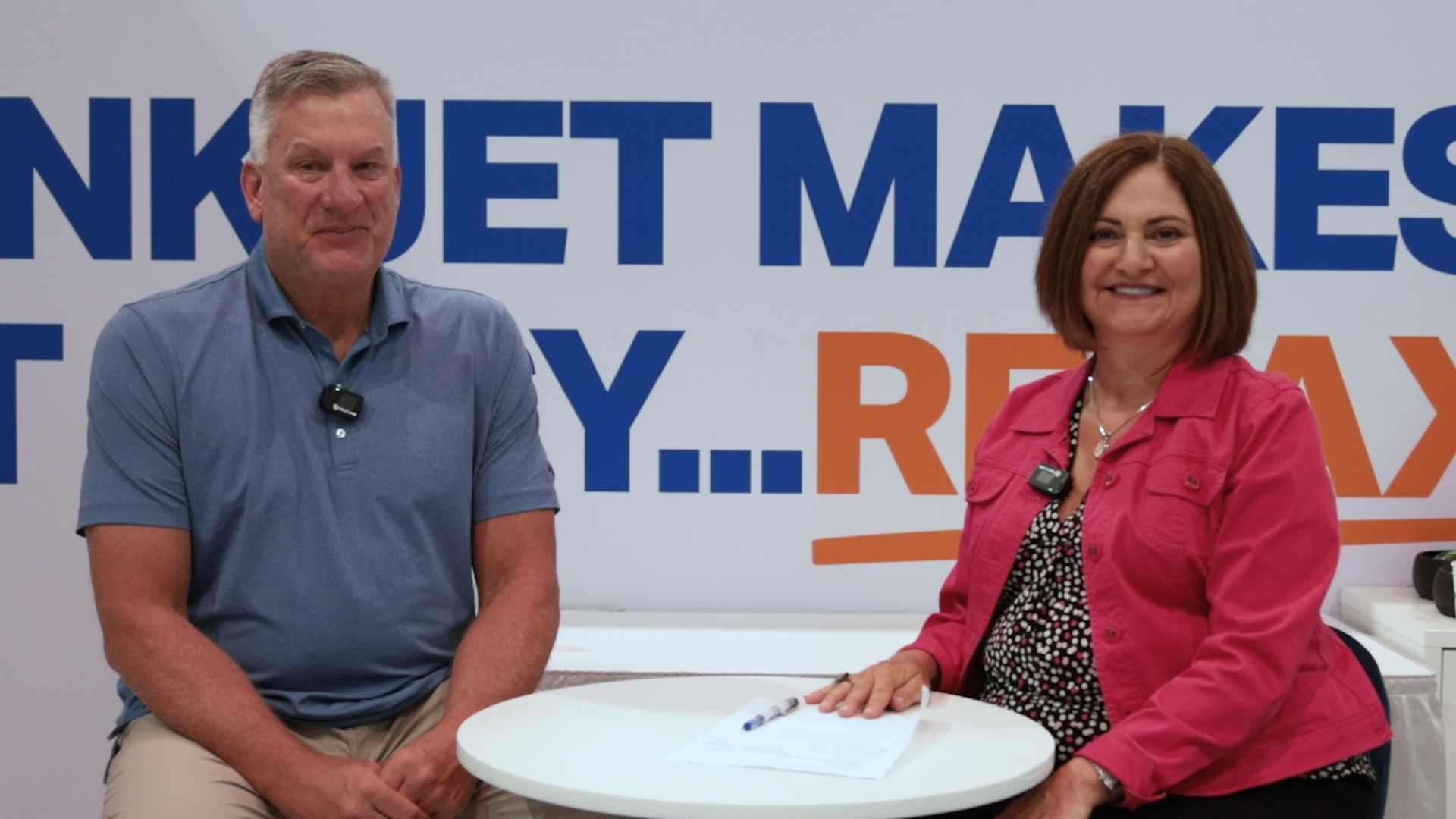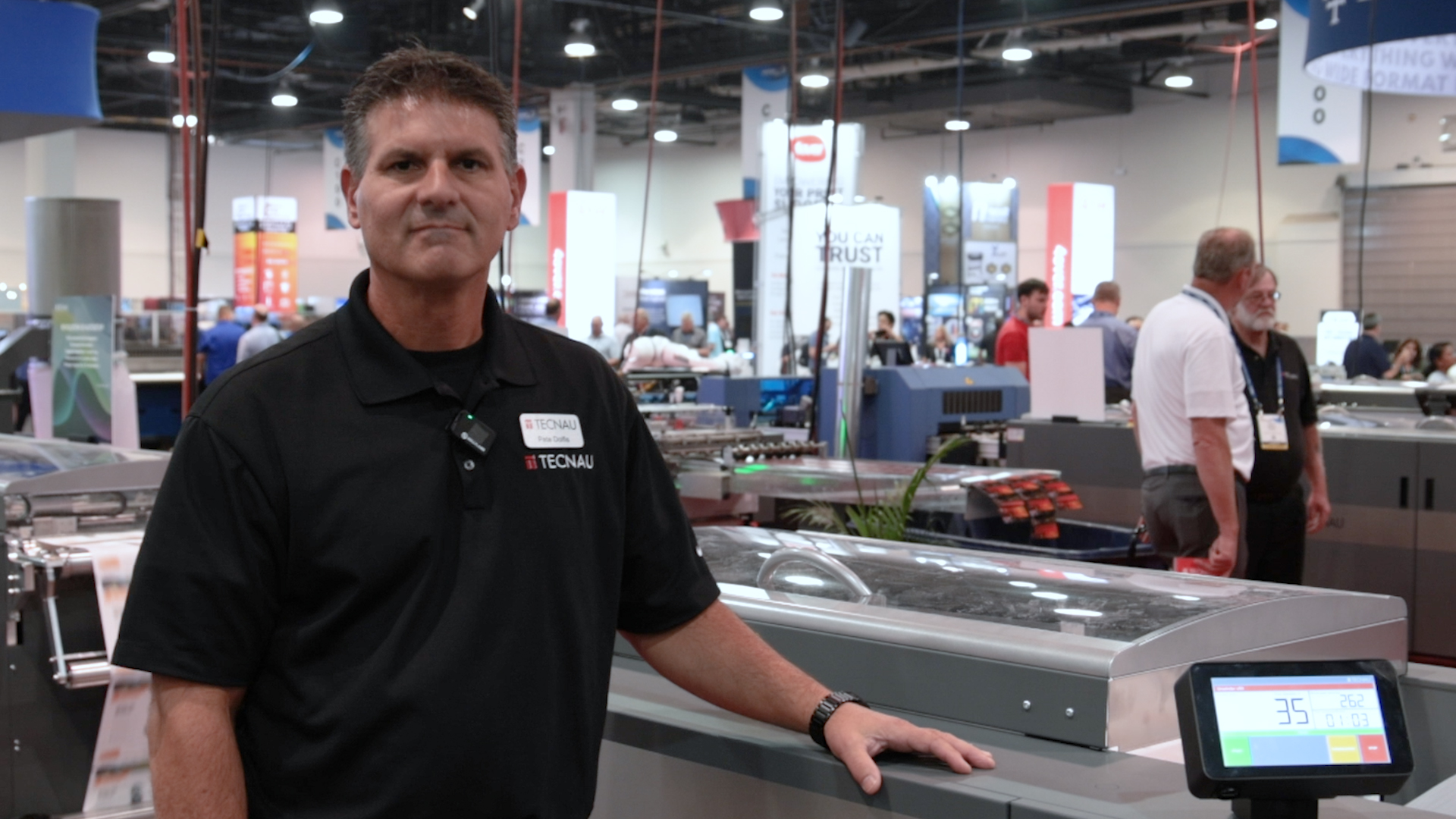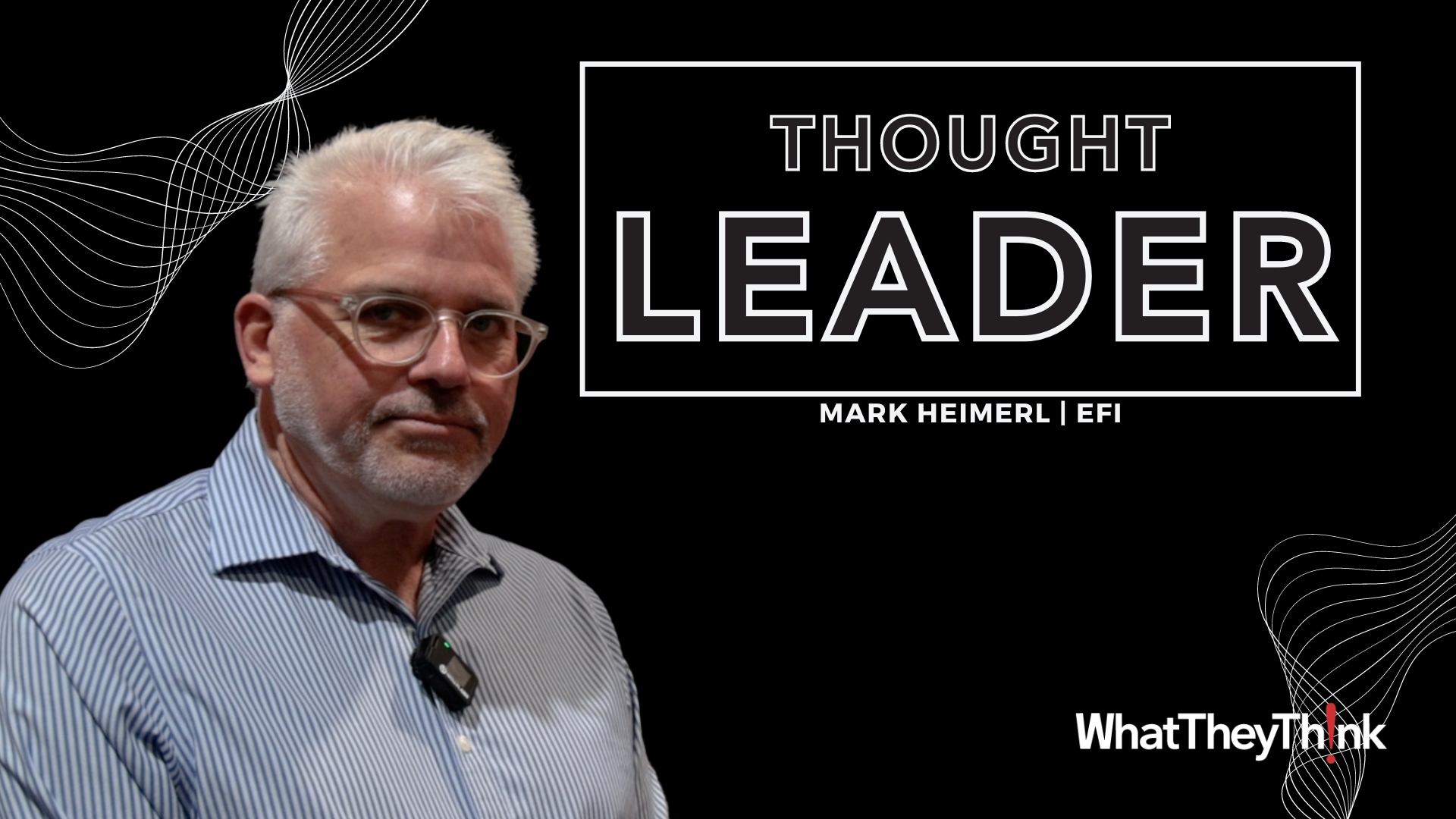Commentary & Analysis
Displaying 2451-2550 of thousands of articles
Insight You Need. Analysis You Trust.
Get the trusted insights you need to understand our evolving industry and emerging trends. Become a Premium Member.
Web-to-Print’s Primary Value is Customer Convenience
Online ordering is about customer convenience. How do you leverage technology and self service to make it easier for your customers to do business with you?
What Buyers Want From Brands...Right Now
As the U.S. economy begins to gradually reopen, marketers are wondering what consumers are thinking. Do they intend to return to shopping as normal? Are their feelings about their favorite brands changing? How do they want marketers to interact with them in these new and changing times? An April 2020 survey from Influence Central provides some insight.
What’s Your Marketing Workflow?—Part 1: Building a Framework
Last month, Pat McGrew offered tips and strategies for optimizing your sales workflow. This month, she turns to marketing workflows. When times get tough, marketing often disappears from the radar. For companies that have not been marketing their services, the challenge of remaining visible in a chaotic market is even harder. In Part 1 of this two-part series, Pat describes how to set up a marketing workflow.
Is Now the Right Time to Gear Up for the Next Era in Digital Print?
Commercial printing has been in decline for the last decade,yet it is still a huge, multi-billion-dollar industry. While the total commercial print volume will continue to slide, digital printing’s share of the pie will continue to grow both in terms of volume and value. This article, sponsored by HP Indigo, looks at three HP Indigo 100K Digital Press customers and the steps they took to push their businesses forward, even as they are dealing with the effects of the global pandemic.
Benson Integrated Marketing Solutions Creates W2P Store for COVID Signage and Safety Materials
Benson Integrated Marketing Solutions offers a wide variety of small- and wide-format printing, signage, apparel, and promotional materials to the multi-family home real estate market. Early adopters of web-to-print, Benson provides individual B2B sites for customers through which they can order customized materials, and has recently launched a B2C site for COVID-related products.
How Much Do Your Jeans Mean to You?
Do you know how much water it takes to make a single pair of jeans? The answer will likely shock you. In this article, Senior Editor Cary Sherburne explores how a commitment to zero-waste fashion—and some emerging technologies—can save precious water and protect our planet yet still let us enjoy those comfortable jeans and other fashion items.
The Impact of COVID-19 on the European Print Industry
WhatTheyThink European section editor Ralf Schlözer looks at May 2020 production index data released by the European statistical office. Unsurprisingly, the data showed a big dip due to coronavirus restrictions with a low reached in April and some recovery starting in May—although there are some country-by-country differences. Roughly speaking, the European print industry lost about 30% of its output volume in April.
Around the Web: Farewell, Folio:. Goofy Gift. Temporary Tees. Pod Printing. Transformed Telephones. Vanishing Views. Foul Food.
BoSacks memorializes the late great Folio: magazine. Customized bobbleheads make grea—well, let’s just say they make gifts. A concept for temporary, recyclable promotional items. English communities adopt and reuse iconic red phone boxes. A new book looks at the impending death of local journalism. “Hot Dog Rice Krispies Treats.” All that and more in WhatTheyThink’s weekly doomscrolling miscellany.
Graphic Design Services—2010–2018
In 2010, there were 15,390 establishments in NAICS 54143 (Graphic Design Services). After something of a contraction due to the Great Recession, graphic design establishments started to grow again, peaking at 15,776 establishments in 2018. In addition, we estimate there were an additional 119,037 freelance graphic design establishments in 2018. In macro news: GDP falls off the cliff.
How Hybrid Digital Textile Print Technology Is Unlocking the Textiles Value Chain
As machine manufacturers increasingly add hybrid functions to textile solutions, production costs go down while throughput goes up; in fact, the EFI Reggiani BOLT can produce more than 5,400 linear meters per hour and can include two analog stations for embellishments such as metallics. These speeds and the accompanying functionality rival traditional analog solutions and have a hugely smaller environmental footprint. Learn more.
Going Remote in the Print Industry
As we’ve all discovered, there are challenges with going remote—in addition to the human component, there are also technological requirements (e.g., IoT and automation). In this article, Keypoint Intelligence outlines strategies for preparing for the current and future realities of our changing business world.
Data Doesn’t Help You If You Don’t Understand or Trust It
Most companies understand the value of data in driving their marketing campaigns. The problem is, most marketers don’t understand or trust the data they have. In fact, when data contradicts preconceived beliefs—the very time data is most important—companies often dismiss the data and go with their guts instead. So what good is it?
Systemize the Predictable in Your Print Business
Your business is made up of two kinds of processes: predictable ones and exceptions. A well-run business has codified or systematized the predictable business processes so that the humans working in the business apply all their skills to the exceptions.
SpeedPro East Bay Declared Winner of the Coveted 2019 Project of the Year Award
The winner of SpeedPro’s 2019 Project of the Year Award, Alameda, Calif.’s SpeedPro East Bay, turned an emergency hospital corridor into a pathway showcasing the rich history of Oakland’s Highland Hospital.
Heidelberg Realignment: A Perspective in Context
Over the last 170 years, Heidelberg has developed many new products, some have rewarded them with great success and others not. As an engineering company, it is in their nature to keep innovating, and as Albert Einstein said, “The only sure way to avoid making mistakes is to have no new ideas.”
Wide-Format, Signage, and Apparel Technology Update
This feature rounds up some of the highlights of our Technology Outlook article and webinar series specific to wide-format, signage, and textiles and apparel, offering up some product releases and trends from the first half of 2020.
How Cloud Computing Is Transforming CCM
Will Morgan, Senior Research Analyst for Aspire CCS, provides some key takeaways from a new report that takes an in-depth look at the state of cloud computing in Customer Communications Management (CCM) and highlights opportunities for enterprises and services providers who are ready to modernize their communications strategies.
Leaving Labels—Heidelberg Selling Gallus
WhatTheyThink European section editor Ralf Schlözer takes a close look at today’s announcement that Heidelberg is selling its Gallus label press business, as well as what the future may hold for Heidelberg.
Graphic Arts Employment—June 2020
As the song goes, “getting better all the time (can’t get any worse)”: in June 2020, overall printing employment is up +1.1% from May, although down -15.5% from June 2019. So a lot of the April damage is continuing to reverse itself.
Around the Web: Garrulous Glove. Clever Cups. Zany Zoom. Substitute Searching. Satisfying Screaming. Deserting Diners. Fudged Form. Callipygous Curation. Classical Cobain.
Engineers have developed a glove that translates sign language into speech. A new reusable silicone mask works as well as an N95 mask. Dixie Cups were the Zoom of the 1918 pandemic. Video imagines if Zoom had existed in 1988. What did we use for Internet searching before Google? A web app lets you scream into the Icelandic wilderness. “Rage Yoga.” For pete’s sake, if you make a restaurant reservation, show up. A faked death certificate done in by a typo. Museum curators are getting to the bottoms of their collections. “Smells Like Teen Spirit” sung in Classical Latin. All that and more in WhatTheyThink’s weekly doomscrolling miscellany.
Keypoint Intelligence Gears Up for Its Outstanding Achievement in Innovation Awards
In a little less than a month, Keypoint Intelligence will be analyzing product submissions for its Outstanding Achievement in Innovation Awards to honor new products and technologies that advance the state of the art in Production Printing. Entries will be judged in six categories based on their new applications of technology in terms of quality, productivity, connectivity, workflow, media range, productivity, and environmental impact.
The Fashion Industry Faces a Step-Change Post-COVID, Say McKinsey and Kornit Digital
What will the fashion industry look like post-COVID? It is broken in so many ways, and has been for some time, with the disruption of the pandemic laying bare the weaknesses and the fragility of the global supply chain. Check out this summary of the discussion at the Kornit Digital Live Talks event, titled “Business Unusual,” featuring Achim Berg, Global Senior Partner at McKinsey & Company.
Training Pays Off: How to Maximize Prepress Training
How well-versed is your prepress staff in using common applications like Adobe InDesign or Photoshop or Enfocus Pitstop? If their knowledge is limited and what should be simple tasks take hours, you’re wasting time (and money). Well-trained prepress employees can give you a competitive edge and increase your profit margins. John Giles offers some easy tips for boosting your staff’s prepress software skills.
Multi-Touch Billboards? Interesting Idea from DuckDuckGo
Multi-touch campaigns aren’t just for direct mail and email anymore. Internet search company DuckDuckGo is using the power of coordinated billboard messaging to communicate a more complex message than we typically see on billboards and taking OOH messaging into new territory.
Partnering to Expand Your Customer Solutions
Partnering can solve challenges that you don’t feel comfortable taking on initially. A partnership also helps you grow your expertise in an area so that when you do expand, you’ll make much better investment decisions.
What’s in Your Sales Workflow?—Part 2: Workflows Have Building Blocks
“Sales Workflow.” These seem like two separate concepts, but sales is a process, processes have workflows, and workflows have building blocks. In part two of this two-part series, Pat McGrew explains how customers are one of those building blocks, and how you manage your relationship with them directly impacts your bottom line.
Mimaki in 3D
Mimaki's recently introduced 3D printer models are giving commercial printers an entry into 3D printing—and are finding applications in some unique market niches.
Sizing the European Printing Industry
Even as revenues are down in the printing industry thanks to the COVID pandemic, the graphic arts industry is a large industry, not only in the US, but also in Europe. Unfortunately, European data is a bit more difficult to come by. WhatTheyThink European section editor Ralf Schlözer dives into numbers and definitions to kick off a round of European industry sizing data.
How Effective is Your Cloth Mask?
Most people understand there is a benefit to wearing a cloth mask to help reduce the spread of the coronavirus. But with so many mask types available, how do you choose the most effective type? Senior Editor Cary Sherburne digs into the latest research on this topic.
Directory and Mailing List Publishing Establishments—2010–2017
In 2010, there were 1,641 US directory and mailing list publishing establishments; by 2017, that number had plummeted to 756.
Around the Web: Vegetable Vending. Penny Peril. Cube Reaction. Noise Negation. Deadly Dolphin. Forms Fun.
Salad bars could be replaced by vegetable vending machines. Will COVID finally kill off the penny? TV shows start using mannequins for sex scenes. A “Rubik’s Cube artist” created a giant portrait of Erno Rubik using 400 of his eponymous cubes. Researchers develop a prototype device for windows that can cancel out outside noise. A terrifying-looking ancient extinct dolphin. Firefighting goats. Librarians use Google Forms to create escape room games. All that and more in WhatTheyThink’s weekly masked miscellany.
Good People, Good Teams, Good Strategy
Making good people decisions about whom to hire, develop, and promote can be devilishly hard. Building good teams of good team players is a roll of the dice without the right data. Wayne Lynn takes a close look at how good teams come together and how behavioral assessments can help pick the right people for the right team.
What Is the Impact of Data on Creative Fashion?
Based on a conversation with experienced buyer Steve Brown and Kornit’s Omer Kulka, textiles expert Debbie McKeegan digs into the impact of data on creative fashion. As the industry’s most valuable currency, data, when used correctly, has the power to transform the industry and paves the way to greater transparency within the supply chain.
Reducing Your Risk at the Printer
Many print service providers have returned to their physical work locations as the United States continues its phased reopening plan. This article highlights information from the CDC to explore how PSPs can limit the spread of COVID-19 while printing.
Canon Solidifies Their Production Inkjet Leadership Position with ProStream 1800
Canon has the leading market share in production inkjet and has the widest range of production inkjet presses available. With the introduction of the ProStream 1800, they are expanding their commercial production inkjet product line to continue to capture both toner and existing offset produced pages.
IT Infrastructure and Software Performance
More and more, the productivity of your company is based on the ability to efficiently work in the software applications that run your business. Don’t hamstring your mission-critical software applications by starving them of the resources they require.
Is It Time to Stop Talking About “Millennials”?
Today, Millennials outnumber Boomers in the US population, and Millennials and Gen Zs are said to account for more than one-third of the workforce. When we are talking about Millennials, we are talking about us. Is it time to start talking about Millennials differently?
The Factory NYC Takes Experiential Graphics to the Next Dimension
Brooklyn-based fabrication shop The Factory NYC is taking experiential graphics and retail displays to the next level with its new Massivit 3D printer, helping make big brands even bigger.
What’s Your Sales Workflow?—Part 1: Managing Customer Relations
In this two-part series, Pat McGrew offers advice, tips, and strategies for optimizing your “sales workflow.” In part one, she takes a look at managing customer relationships via a CRM.
Paper Treatment to Protect Against Spread of Coronavirus
Is there a way to help prevent the spread of COVID-19 through printed materials using an antimicrobial paper treatment? Under the current circumstances, no commercial lab has a suitable test environment or authority to test against COVID-19. However, there may be a suitable solution tested against a similar virus.
Fence-Free Collaborative Robots 4.0: Cobots and Robots Change the Printing Industry
The advent of small robots that bypass established robot security requirements (fences, scanners etc.) spawned “fence-free robots,” also known as “cobots” for their ability to collaborate with human operators. Graphic Robotics' Henrik Christensen looks at the current state of fence-free robots and their potential place in printing operations.
drupa 2021 Essentials of Print: Assessments, Platforms, and Making Money with Workflow
The most expensive things you do in your printing plant every day involve talking to clients and physically touching their work. You talk to clients to better understand the work they want you to do, and you touch the work, in prepress or at other points in the process to ensure that the client’s intent is rendered on to the substrate. But every conversation and every touch has a financial impact. While you rely on workflow tools to aid the process, in most companies there are also spreadsheets, whiteboards, and sticky notes used to gather and communicate information about the jobs-in-progress. It’s only natural! However, the more you talk and touch, the less money you make on the job.
Factory Automation for Printing Fabric On Demand Translates to Big Business for Raspberry Creek Fabrics
Diana Rammell wanted better fitting clothes but was disappointed in the selection of fabrics she could find. So she took matters into her own hands, founding Raspberry Creek Fabrics in 2010 to create more compelling fabric designs. When her dreams got a little out of control, her attorney husband, Justin, stepped in to help. Today, the company produces some 40,000 yards of custom fabrics every month and continues to grow.
April Printing Shipments—Here We Go
As we expected, April 2020 printing shipments took a tumble—falling from $7.18 billion in March down to $6.56 billion. Hmm...what could have caused that?
Around the Web: Digital Dyeing. Hat Hare. Color Conflict. Banning Ban. Bistro Bots. Bringing Back Boomboxes. Conferencing Cleanliness. Crazy Car Concept. Hidden Honda. Larson’s Latest.
More sustainable options for fabric dyeing. Turn your pets’ fur into knittable yarn. Today’s designers are taking new approaches to working with color. LinkedIn now offers audio support for correct name pronunciation. Berlin public transport bans deodorant to promote mask wearing. A Dutch restaurant uses robot waitstaff to enforce social distancing. “Boombox restoration.” NYC’s canceled Shakespeare in the Park heads to radio and podcasting. A municipal councillor in Spain neglects to turn off video while showering during a Zoom call. BMW to offer auto features on a subscription basis. Words of advice: don’t microwave library books. “The Far Side” is back...sort of. All that and more in WhatTheyThink’s weekly masked miscellany.
Estimating: Your Customers Least Favorite Aspect of Print Buying
Getting your customer’s pricing is a critical measure of customer satisfaction. Your customer might not be outwardly complaining, but many print customers are migrating to online solutions that provide immediate pricing. Not every job you produce deserves a manual estimate.
Donuts Lead the Way in Return to Normalcy —June 2020 M&A Activity
Southern Champion Tray Acquires, Brook & Whittle Establishes Western Presence, and more…
Does It Take a Pandemic to Change the Fashion Industry—Will COVID Be the Catalyst for Change?
Textiles expert Debbie McKeegan asks why it takes a pandemic to change the fashion industry, which has long been recognized as the world’s second largest polluter. Perhaps change is on the way, with manufacturers forced to re-examine fragile supply chains. Still, a lot will depend on changing consumer demands!
COVID-19 Accelerates Channel Fog and Channel Fatigue
Contrary to many assumptions and preconceived notions, the share of transactional communications that consumers accessed electronically declined steadily over the past three years. This article explores how the ongoing COVID-19 pandemic is accelerating consumers’ demands for service providers to communicate with them via their desired channels.
Five (No or Low-Cost) Ideas for Turning Downtime into a Path to a Stronger, More Profitable Business
Your print shop is still open and you don’t want to lay off or furlough employees unless you have to, but the work isn’t flowing in like it was. How can you justify keeping them on? One of the answers is to see this as an opportunity to invest in strategies that will pay off in an even stronger, more profitable workplace for everyone long term. Here are five ideas for starters.
The PPP Comes to the Aid of the Industry
The Government has begun releasing details of the recipients of Paycheck Protection Program (PPP) aid. In general, the Treasury Department and SBA have issued $7.2 billion to graphic communications industry businesses, retaining 440,609 industry jobs. We break down loan amounts paid out to industry businesses by NAICS code, as well as the number of jobs retained.
What Came Before Munsell and Pantone?
Back before Pantone, and even before Munsell, there was the Traité Des Couleurs Servant à la Peinture à L’ea. Colorkarma’s Shoshana Burgett traces the colorful history of the color reference guide.
Between the Sheets: Digital Printing for a Digital World
More businesses and brands embrace digital print as an efficient and cost-effective way to reach their audiences. This article, sponsored by Neenah Paper, offers some tips, best practices, and new ideas for using digital printing for direct marketing, and looks at the latest in Neenah’s popular Explore series that uses creatively designed print samples to help designers and printers alike get the most out of digital printing technologies.
SpeedPro Launches InfoLnkX for Contactless Restaurant Menus—and More
In development even before COVID-19 hit, InfoLnkX by SpeedPro is an NFC-based chip that can be programmed to deliver digital, contactless menus to patrons’ phones right from restaurant signage or table decals. But the uses for InfoLnkX go far beyond restaurant applications.
The Amazing Balance That Was Creo Culture
A company’s culture determines how employees feel about working there, the velocity at which decisions can be made, and the quality of those decisions. It’s the difference between a place people work at and a company they work for. Contributor David Kauffman reminisces about his days at Creo and the decision-making culture prevalent there.
Trends Update: Textiles and Apparel
As we proceed into the second half of 2020, Cary Sherburne rounds up some of the top textile and apparel trends we have seen thus far this year.
Inkjet Outlook: Interesting Times Ahead
Inkjet Insight’s Elizabeth Gooding looks at the top trends in production inkjet technology, and highlights recent product introductions from HP and Canon.
Book Publishing Establishments—2010–2017
In 2010, there were 2,973 US book publishing establishments; by 2017, that number had dropped to 2,440. Book publishers are especially well-represented in Non-Employer Statistics.
Around the Web: Fussy Font. Rotten Restoration. Cheering Chandler. Cool Covers. Fragile Facemask. Telephoning Tenors. Violin Vegetation. Loopy Lexicon. Segway Sayonara.
Goldman Sachs designs its own typeface—with some important caveats. Art restoration is best done by a professional. Raymond Chandler: king of the opening paragraph. How does a book cover become iconic? French researchers develop a transparent glass facemask. “Opera by phone.” A string quartet performs for an audience of plants. AI-generated fake English words. The Segway is being discontinued; the word “segue” is now safe. All that and more in WhatTheyThink’s weekly masked miscellany.
Miyakoshi Flexes its Packaging Muscles with New Inkjet Press
Last week, Miyakoshi Printing Machinery launched the MJP30AXF web-fed digital inkjet press, focused on the short-run, flexible packaging market. The company is positioning the MJP30AXF for success in the fast-growing flexible food and beverage segment by using water-based, pigment inks that the company says are safe for food packaging. Inkjet Insight’s Elizabeth Gooding takes a look at the MJP30AXF.
World Environment Day—Precious Resources and Textile Manufacturing
Earlier this month was World Environment Day, founded by the United Nations in 1974. It’s a good time to step back and re-examine how the textile industry, the world’s second largest polluter, can make changes to become more sustainable. Textiles expert Debbie McKeegan notes that sustainability can’t be a luxury item; it has to be an essential element.
Mass Optimization: How Small Changes Can Save Big Money
Customers’ needs are evolving, and many might request office and marketing collateral as well as posters and signage in the same order from their preferred print service provider. Each application will have a unique set of requirements, workflow tasks, and output technologies. This article explores how mass optimization can improve automation and boost workflow efficiency.
Funny Marketing Fails NOT to Try Yourself
It’s been a long, difficult road recently. Time for some levity...and some actionable marketing lessons thrown in as a bonus. Here are some marketing fails you don’t want to try yourself.
2020 Top 100 Small Commercial Printers
Each year, Printing News invites small commercial print business owners to participate in our Top 100 Shops Survey. This article presents the results of that survey, this year’s Top 100 small commercial printers, and profiles of the Top 6.
Projects: Getting Stuff Done in Your Print Business
Every business has projects. Every business treats them differently. The range is enormous; from no project methodology to bureaucratic craziness. Print businesses of all sizes would benefit from a simple project methodology because it can quickly eliminate the most common reasons why things just don’t get done.
Hybrid Software Brings Packaging Workflows to a New Level of Automation
Packaging has been going through a digital renaissance of late, and as the printing and converting hardware has been evolving, the workflow software to maximize the utilization of that hardware has been evolving as well. Based on these latest updates and solutions, it is apparent that Hybrid is looking at the requirements of Industry 4.0 and the interconnected business and manufacturing landscape.
The SGIA/PIA Merger Explained
On May 1, 2020, the Specialty Graphic Imaging Association (SGIA) and the Printing Industries of America (PIA) merged to become PRINTING United Alliance (PUA). Ford Bowers, President and CEO of the combined organization, reveals many of the details of the merger and what it means for members.
Spreading Smiles...Not Cooties: Personalized Masks Bring a Little Humor During Difficult Times
Inkjet Insight co-founder Mary Schilling describes how she used her digital printing skills to start a cottage industry making masks...with a little help from her friends.
Will On-Demand Manufacturing Be the New Normal Post-Pandemic for Textiles and Apparel?
How much of the post-pandemic “new normal” will involve on-demand manufacturing for textile-based products? Already we are hearing from on-demand manufacturers that their businesses are seeing increased demand, both due to the pandemic-related supply chain disruption and a general move in the industry to more efficiency, less waste, and more sustainability. In this story, we provide examples of how an on-demand manufacturer is helping both startups and brands achieve these goals.
TempDefend—Dynamic Digital Signage with Thermal Detection Enables “Protection as a Service”
Last week, 22Miles—a developer of digital signage and wayfinding systems—launched TempDefend, a highly customizable “protection as a service” solution that integrates dynamic digital signage with thermal cameras to scan visitors to a business or other establishment, generating an alert if the visitor’s temperature exceeds 99.5°.
A Tale of Two Cities: The Pandemic Years
Annualized profits for Q1 2020 took a nosedive from $990 million to -$4 billion. Sure, the pandemic hit in the last three weeks of the quarter, but this is an old story that predates COVID.
Around the Web: Cap Catastrophe. Friendly Fencing. Filmy Facemasks. Missing Money. Palatable Paper. Defiant Devices. Terrifying Tweeting.
Pepsi’s Philippines marketing plan goes horribly awry. Social distancing fences bring neighbors closer together. Swiss researchers are developing transparent facemasks. Coronavirus consequence: a coin shortage. A Japanese printing company develops edible pads of paper. One man’s battle with an obstinate refrigerator. Why is Cooper Black such a ubiquitous typeface? Twitter is launching audio tweeting, which can only have positive effects. Basecamp launches a new email platform, for some reason. All that and more in WhatTheyThink’s weekly Phase 3 reopening miscellany.
A Printing Fan’s Bucket List
Some people just love print, and you can count me among them. It should therefore come as no surprise that my bucket list—the things I hope to do before I die—involves visits to a handful of printing museums and other institutions that are sprinkled across the United States and Canada. This article provides a brief overview of my experiences with these locations so far.
Emerging Textile Trends and What to Expect from the New Normal Post-COVID-19
What can we expect in the textiles and apparel industry post-COVID-19 and what might the new normal look like? Will there be more room for micro-brands? Will consumers shift focus to more sustainable solutions? Textile expert Debbie McKeegan addresses these and other questions.
Survey: Highlights on the State of Digital Packaging
Highlights from “Digital Packaging: The Time Is Now!” (Napco Research) with a focus on changes in attitudes toward digital packaging and how technology is no longer the limiting factor in adoption.
The Print Software Evaluation Process
Evaluating print software is a process that desperately needs to evolve. Step back and look at the business objectives of the evaluation as a starting point to reinventing your approach to purchasing software.
APTech Adapts to Uncertain Times
Thayer Long discusses how APTech has used its lockdown period developing new programs and content to help OEMs and PSPs get closer to their customers.
Kodak Rebuilds and Innovates with New Digital and Offset Products to Support Future Growth
Kodak has been rebuilding, innovating, and is ready reclaim their leadership position. Refocused direction and new products that will support their customers’ needs will get them there.
What Is the Role of the RIP in Process Automation and Supply Chain Efficiencies?
The COVID-19 pandemic has laid bare the fragility of the global supply chain for textiles and apparel. This is driving brands and retailers to give more thoughtful consideration to how they can streamline that supply chain, bringing production closer to the point of use and eliminating at least some of the inventory risk inherent in the current process. In this article, we explore the role of the digital front end (DFE or RIP) for digital textile printers in making this a viable alternative to the current offshore bulk manufacturing of printed textiles and apparel.
The Sign Connection: Tips for Sign and Graphics Companies During COVID-19
Image360’s Burke Cueny discusses some of the ways that Image360 centers have helped their sign and display graphics customers during the pandemic, and offers tips and strategies as we move forward.
Around the Web: COVID Cobbler. Clawed Clothing. Yarn Yeomen. Chiropteran Cacophony. Antiviral Vehicles. Bottle Blunder. Venerating Velázquez. Blacklight Book.
Shoes designed for social distancing. A Japanese zoo raises money selling lion-mauled jeans. An online yarn store helps its customers and suppliers get through the crisis. An album based on bat songs. What impact will COVID have on car design? A gin distillery also manufacturing hand sanitizer gets its bottles mixed up. Reenactors bring a Velázquez painting to life. An upcoming cmic book will be printed using fluorescent blacklight inks. All that and more in WhatTheyThink’s weekly slowly reopening miscellany.
Periodical Publishing Establishments—2010–2017
In 2010, there were 7,221 US periodical publishing establishments; by 2017, that number had dropped to 5,279. Magazines have been struggling in the Internet age, with closures and consolidations, but also have been seeing a shift in what constitutes “periodical publishing.” Also: we’re officially in a recession (surprise).
The Case for Advanced Inks and Dryers in Production Inkjet Printing
System vendors and paper mills are working diligently to create effective strategies for inkjet printing jobs that require glossy finishes and high coverage levels. These solutions can be separated into inkjet-treated papers and advanced inks and drying systems. Last week’s article discussed the pros and cons of inkjet-treated papers. This piece, the second in our two-part series, addresses advanced inks and drying systems.
Investing in Human Capital
Many of you are worried if you’ve got enough cash and other forms of financial capital to get to the other side of the COVID-19 crisis. This is a short-term issue and, if you survive, maybe you’ll have more cash on hand next time we see a downturn. But what if the market and your business changes so much you have people who are no longer relevant? Wayne Lynn explores some thoughts that can help you plan for and be prepared for this issue.
Five Sustainable Furnishing Fabrics and Where to Buy Them—Choose Eco-Friendly Textiles
There is growing demand for customized home décor as well as sustainable fabric solutions. Textile expert Debbie McKeegan explores five sustainable furnishing fabrics and why it is important to choose eco-friendly textiles.
Becoming A Trusted Advisor: How Service Providers Can Leverage The CXM Revolution to Secure Long-Term Profitability
The Customer Communications Management (CCM) market is undergoing radical changes on an evolutionary scale. Late last year, Aspire CCS surveyed businesses across the globe, interviewed stakeholders in every facet of the market, and published an extensive report entitled, “The State of CCM-to-CXM Transformation.” This second of a four part seriesfocuses on customer communications service providers’ place in the emerging ecosystem by examining the five steps to CXM maturity and explaining how providers can upgrade their technology and strategy to move up the scale, ensuring their long-term viability.
Want Job Opportunities? Create Them!
Part two of Heidi Tolliver-Walker’s interview with Arnie Kahn, president of PrintLink, a job placement service for the printing industry, about opportunities in a post-COVID-19 environment. Kahn describes opportunities for the right candidates to make lateral moves into new areas, such as changing market verticals or applying skill sets to new printing sectors.
COVID-19's Impact on the Print Sales Process
So many trends are being amplified or accelerated by COVID-19; the evolution of the sales process is one of them. Your customers are being asked again to do more with fewer people and less time. They need vendors/partners that can help alleviate the pressure.
What’s the Big Deal About A Sales Process?
Most sellers don’t want to think about their sales process, they just want to sell. But there are many benefits to having a clearly defined ands adhered to sales process. Lisa Magnuson outlines several steps to follow to increase sales.
Fine Dining: How Print Businesses Can Help Restaurants Reopen
As businesses start to reopen, they will have post-COVID print needs beyond safety and distancing signage. To follow up last week’s look at the current signage environment, Richard Romano identifies some of the unique print needs reopening restaurants are likely to have to complement their signage.
Spoonflower Community Responds to COVID-19 Pandemic
With more than 1.8 million design options in its library, and with the availability of easy-to-use mask kits, Spoonflower and its designer community have responded in force to the need for masks, making more than 150,000 non-medical-grade fabric masks. Senior Editor Cary Sherburne spoke with Michael Jones, Spoonflower’s new CEO, and Kerry King, Senior Vice President of R&D, to learn more about this outstanding response and to get an update on what’s new at Spoonflower.
Regional Print Consolidator Builds Diverse Offerings—May 2020 M&A Activity
Graphic Village acquires DMS ink, Brook & Whittle adds Croydon, and more…
Cutting Safety in the Printing Industry
At any stage in the printing process, a worker may use a cutting tool, which implies a level of risk. As a result, cutting safety is essential, whether in large-scale printing outfits like book printing, or smaller operations like retail screen printing. This feature, sponsored by Slice, offers tips for ensuring the safe use of cutting equipment.
Around the Web: Wonderful Wodehouse. Addled Addressing. Simplified Cellphone. Correcting Collaboration. Distance Dousing. Coloring Kerrang. Goofy Graduation. Awkward Academia.
A tribute to P.G. Wodehouse. A simpler, more surreal approach to specifying physical addresses. Replacing the cellphone touchscreen with a dial. How AI can foster workplace collaboration. A water gun designed specifically for the clergy. Metal magazine Kerrang! turns their covers into coloring pages. NYU’s ill-fated “virtual reality” graduation. What will post-pandemic academia look like? All that and more in WhatTheyThink’s weekly slowly reopening miscellany.
Graphic Arts Employment—April 2020
Here we go: in April 2020, the overall printing employment was down -19.2% from March and down -21.4% from April 2019. We’ve been expecting this.
What’s The Real Impact of COVID-19 On the 2020 University Graduates?
The British Fashion Council and the CFDA both call for the industry to slow down, adopt sustainable practice and reject over consumption. It’s a big ask, and many in the industry want this change, the reality may be that “fast fashion” has created a consumer neurosis within retail and that will take some undoing. Read the full article
The Case for Treated Papers in Production Inkjet Printing
System vendors and paper mills are working diligently to create effective strategies for inkjet printing jobs that require glossy finishes and high coverage levels. These solutions can be separated into inkjet-treated papers and advanced inks and drying systems. This article, the first in a two-part series, will discuss the pros and cons of inkjet-treated papers. Next week’s piece will address advanced inks and drying systems.
Question: Is Daylight Really D50? Answer: Yes!
Ryerson University’s Dr. Abhay Sharma provides a detailed look at color temperature, and why it is important for color management. He also uses his downtime to empirically determine that “daylight” is a very good match to the D50 standard.
The Print Industry After COVID-19
COVID-19 economic symptoms include the weakening of the “we’ve always done it this way defense”—which will have some positive impacts on outdated printer workflows and some negative impacts when customers evaluate print spend under new market conditions.
Got Emotional Connection? Then You’ve Got Profits
What is the secret to keeping customers from switching to a competitor with lower prices, faster curbside pickup, or a coupon that drops at just the right time? Motista, a provider of predictive intelligence, thinks it has the answer. Customer affinity. A look at the conclusions and data from its two-year study.
- Questions to ask about inkjet for corrugated packaging
- Can Chinese OEMs challenge Western manufacturers?
- The #1 Question When Selling Inkjet
- Integrator perspective on Konica Minolta printheads
- Surfing the Waves of Inkjet
- Kyocera Nixka talks inkjet integration trends
- B2B Customer Tours
- Keeping Inkjet Tickled Pink
© 2024 WhatTheyThink. All Rights Reserved.














